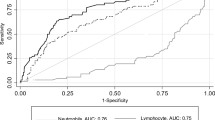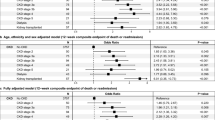Abstract
Background
COVID-19 poses a significant threat to patients with comorbidities, such as diabetes and chronic kidney disease (CKD). China experienced a nationwide COVID-19 endemic from December 2022 to January 2023, which is the first occurrence of such an outbreak following China’s widespread administration of COVID-19 vaccinations.
Methods
A total of 338 patients with diabetes and CKD combined with COVID-19 infection between December 7, 2022 and January 31, 2023 were included in this study. The end follow-up date was February 10, 2023. Univariate analysis and multivariate Cox analysis were used to analyze risk factors for death.
Results
During the 50-day median follow-up period, 90 patients in the study cohort died, for a mortality rate of 26.63%. The median age of the study cohort was 74 years, with a male predominance of 74%. During hospitalization, 21% of patients had incident AKI, 17% of patients experienced stroke, and 40% of patients experienced respiratory failure. Cox proportional hazard regression showed that older age, a diagnosis of severe or critically severe COVID-19 infection, incident AKI and respiratory failure, higher level of average values of fasting glucose during hospitalization, UA, and total bilirubin were independent risk factors for death in our multivariate model.
Conclusions
These findings highlight the critical importance of identifying and managing comorbid risk factors for COVID-19, especially among the elderly, in order to optimize clinical outcomes, even after COVID-19 vaccination.





Similar content being viewed by others
Data availability
The data that support the findings of this study are available from the corresponding author, upon reasonable request.
References
D’Marco L et al (2020) Diabetic kidney disease and COVID-19: the crash of two pandemics. Front Med (Lausanne) 7:199
Tang N et al (2020) Anticoagulant treatment is associated with decreased mortality in severe coronavirus disease 2019 patients with coagulopathy. J Thromb Haemost 18(5):1094–1099
Leung C (2020) Clinical features of deaths in the novel coronavirus epidemic in China. Rev Med Virol 30(3):e2103
Holman N et al (2020) Risk factors for COVID-19-related mortality in people with type 1 and type 2 diabetes in England: a population-based cohort study. Lancet Diabetes Endocrinol 8(10):823–833
Cai R et al (2021) Mortality in chronic kidney disease patients with COVID-19: a systematic review and meta-analysis. Int Urol Nephrol 53(8):1623–1629
Leon-Abarca JA et al (2020) The impact of COVID-19 in diabetic kidney disease and chronic kidney disease: a population-based study. Acta Biomed 91(4):e2020161
Baden LR et al (2021) Efficacy and safety of the mRNA-1273 SARS-CoV-2 vaccine. N Engl J Med 384(5):403–416
Khwaja A (2012) KDIGO clinical practice guidelines for acute kidney injury. Nephron Clin Pract 120(4):c179–c184
Galiero R et al (2022) Association between renal function at Admission and COVID-19 in-hospital mortality in Southern Italy: findings from the prospective multicenter Italian COVOCA study. J Clin Med 11(20):6121
Jeong HE et al (2023) Association of adverse respiratory events with sodium-glucose cotransporter 2 inhibitors versus dipeptidyl peptidase 4 inhibitors among patients with type 2 diabetes in South Korea: a nationwide cohort study. BMC Med 21(1):47
Kornum JB et al (2007) Type 2 diabetes and pneumonia outcomes: a population-based cohort study. Diabetes Care 30(9):2251–2257
Huang D et al (2022) Empagliflozin protects against pulmonary ischemia/reperfusion injury via an extracellular signal-regulated kinases 1 and 2-dependent mechanism. J Pharmacol Exp Ther 380(3):230–241
Marton A et al (2021) Organ protection by SGLT2 inhibitors: role of metabolic energy and water conservation. Nat Rev Nephrol 17(1):65–77
Cheng Y et al (2020) Kidney disease is associated with in-hospital death of patients with COVID-19. Kidney Int 97(5):829–838
Acknowledgements
The authors thank AiMi Academic Services (www.aimieditor.com) for English language editing and review services.
Funding
This study was supported by Health Commission of Sichuan Province Program (No.21ZD001), and Key Research and Development Projects of Sichuan Province (No. 2021YFS0368).
Author information
Authors and Affiliations
Contributions
YZ conceived and designed the study, collected and analyzed the data, and drafted the manuscript. CQ, QY, YL, KL, FY, and XL assisted with the study design and data collection. YZ, TZ, MW, RS, and WY provided statistical expertise and contributed to the data analysis and interpretation. YZ and LC contributed to the study design, data interpretation, and critically revised the manuscript for important intellectual content. FL provided guidance on the study design and data interpretation and contributed to the critical revisions of the manuscript. All authors read and approved the final manuscript.
Corresponding author
Ethics declarations
Conflict of interest
The authors declare no conflicts of interest.
Research involving human participants and/or animals
All procedures performed in studies involving human participants were in accordance with the ethical standards of the institutional and national research committee and with the 1964 Helsinki Declaration and its later amendments or comparable ethical standards. The study was approved by the Ethics Committee of the West China Medical Center of Sichuan University (No. 2023R30).
Informed consent
Informed consent was assigned.
Additional information
Publisher's Note
Springer Nature remains neutral with regard to jurisdictional claims in published maps and institutional affiliations.
Supplementary Information
Below is the link to the electronic supplementary material.
Rights and permissions
Springer Nature or its licensor (e.g. a society or other partner) holds exclusive rights to this article under a publishing agreement with the author(s) or other rightsholder(s); author self-archiving of the accepted manuscript version of this article is solely governed by the terms of such publishing agreement and applicable law.
About this article
Cite this article
Zou, Y., Qin, C., Yang, Q. et al. Clinical characteristics, outcomes and risk factors for mortality in hospitalized diabetes and chronic kidney disease patients after COVID-19 infection following widespread vaccination. J Endocrinol Invest 47, 619–631 (2024). https://doi.org/10.1007/s40618-023-02180-7
Received:
Accepted:
Published:
Issue Date:
DOI: https://doi.org/10.1007/s40618-023-02180-7




